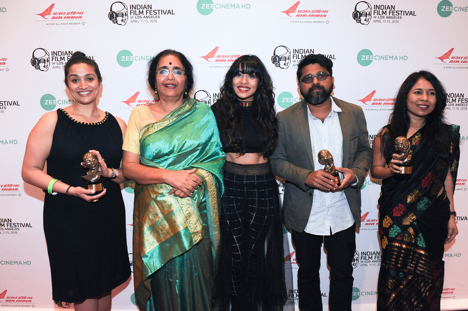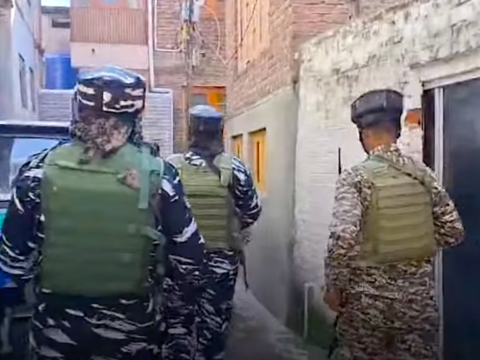LOS ANGELES (Diya TV) — The Indian Film Festival of Los Angeles concluded their 16th year Sunday, April 15 with nostalgia, thrilling mystery and light hearted optimism. The final day of the fest featured a tribute to the late Sridevi, with a special screening of Chandni, followed by the mystery thriller The Ashram which was preceded by the short Fifteen Years Later.
The closing night film was an Assamese language, coming of age story, Village Rockstars.
Before the final film, the awards ceremony honored the filmmakers for their achievements. The awards were decided by a jury as well as audience votes. When accepting the award for Audience Choice Award for Best Documentary (Lovesick), Priya Giri Desai said the best thing about IFFLA is the audience. During the week, the filmmakers in attendance participated in Q&As after their films and were blown away be the insightful and enthusiastic questions and comments from the audience. IFFLA is an intimate festival where the audience can easily approach the filmmakers and talk with them about their films. It really provides an inclusive atmosphere that celebrates the love of cinema.
Another thing that stood out to the filmmakers and festival attendees were the shorts. When asked what films they liked the most, many expressed how impressed they were by the shorts program this year. There were two shorts programs containing multiple films as well as a few features preceded by a short film. The fact that the shorts were so impactful in their short duration is also what made them noteworthy. At the start of the awards ceremony, the IFFLA programming team mentioned how they were blown away by the thrilling voices of the short films.
The Audience Choice Award: Best Short went to An Essay of the Rain directed by Nagraj Manjule. The Grand Jury Prize for Best Short was presented to The Caregiver, directed by Ruthy Pribar. Regarding the Grand Jury Prize for Best Short, the jury awarded, “a film that we loved for its elegant representation of the nuances between compassion and survival, and for its understated yet decisive storytelling.”
A special jury mention was made for Counterfeit Kunkoo, which the jury called “an incredible short film about apartment hunting in Mumbai that not only manages to be well-paced, gripping and bold but also a heart-wrenching perspective into gender inequality in metropolitan India.”
The audiences at this year’s IFFLA chose Take Off directed by Mahesh Narayanan as their favorite narrative feature film of the festival. Lovesick, directed by Priya Giri Desai and Ann S. Kim took the Audience Award for Best Documentary.
A special jury mention was made for Sushama Deshpande’s performance in AJJI. The jury stated: “Taking on difficult characters is always a challenge for an actor. It takes courage to humanize and portray a role that breaks the stereotypes. This actress demonstrated undeniable talent and commitment to deliver an authentic and grounded performance.”
Village Rockstars took home the Grand Jury Prize for Best Feature. In awarding the Grand Prize, the narrative jury stated: “This film explores gender expectations in a gentle manner. It blends beautiful cinematography with naturalistic performances in a fun and uplifting coming-of age story. Working as a one woman army, this director created an unforgettable portrait of childhood.”
Female filmmakers made quite the impression this year so it was only fitting that the award winning Village Rockstars was the closing night film. Rima Das not only directed the film, but she also was the cinematographer, art director, editor and more. When asked about the origin of the film, Das explained that she was not sure she was going to make a feature alone. Over the course of four years, Das took on the many roles primarily due to lack of funds. She expressed it was challenging but there was also a freedom to being a ‘one woman show’; there was no pressure. So she just took the challenge.
She filmed in the village of Assam, where she is from, and as the main characters are children, whom she filmed early in the morning and after school. A benefit to this constraint was that she was always filming during “magic hour” and the optimal lighting hours. Also, the weather in the area is unpredictable so she had to always be ready to film which is much easier when she is the only crew to organize.
This style of filming, gave the film a documentary type feel. There was no full script but there was a structure. She would write a scene and go shoot it. In the initial stage, the story did not change – a girl dreaming of owning a guitar. However, over the course of filming, a sweet mother daughter relationship story developed. After the film, an audience member asked if they are actually mother and daughter and Das confirmed they are. The mother character is a strong woman and recalling the inspiration for that, Das mentioned how her own mother is strong and it was from her own imagination. Referring to the relationship in the film, Das expressed she wants motherhood to be like that.
Regarding the initial inspiration, Das said she met some amazing children in her village who inspired her and she liked how, “Children, they can dream”. She casted the boys first and the lead girl was around while they were doing the initial filming. Das recounted how the girl was so naughty and climbing trees; she sounds just like her character. Then this girl slowly was overpowering the boys with her presence. “There was something in her face, she was so strong” said Das. The children and the way they were filmed gives the film an extremely natural and realistic feel which in turn adds to the documentary vibe. The pacing of the over all film is a bit slow but this is not so much a problem as you are in this world exploring it with the children.
In the film, there is flood which happens annually in the area. At the time of filming, it was not on Das’ mind to include the flood as part of the story. Then a flood happened but she did not want to film it because her film was not a documentary. Then, it flooded again and she found it did fit within the story – it is a part of the characters’ lives. After a couple weeks, they all go back to their lives and that is how Das felt it fit within her story.
After the full week of films, film discussions and meeting new people, seeing old friends, attendees and filmmakers bid farewell to IFFLA and went back to their lives. However, there was one last time of mingling and some dancing at the closing night gala. A few filmmakers commented how their were sad that the festival was over but they had such a wonderful time.
Film festivals bring people together to celebrate their love of cinema and IFFLA did that once again.
Until next year!



